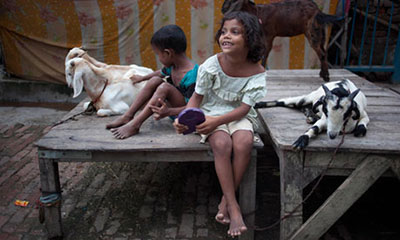AS this week’s article is presented to you, I can’t help but feel forlorn with thoughts of the impacts that this phenomenon will have on the younger generation, situations that were not their creation but will be their legacy.
Climate change as we know it is a devastating reality and one that our children will come to know and bear the brunt of its consequences.
Children are not responsible for climate change. But they may ultimately be the ones suffering the most and in risk of not surviving.
Ulla Tørnæs, Minister for Development Cooperation, Government of Denmark
According to the World Health Organization,children are a vulnerable group and climate change poses one of the biggest health threats to children in the 21st century. No one is immune to the effects of climate change, but one of the largest groups to be affected will be children under the age of five.
 By altering weather patterns and disturbing ecosystems, climate change will have significant implications for human health, especially children, since many of the global killers of children are sensitive to climatic changes such as flooding and drought. Currently it is reported that children are dying from a small number of preventable and treatable disease and conditions, including diarrhea, malaria and malnutrition due to climate related changes.
By altering weather patterns and disturbing ecosystems, climate change will have significant implications for human health, especially children, since many of the global killers of children are sensitive to climatic changes such as flooding and drought. Currently it is reported that children are dying from a small number of preventable and treatable disease and conditions, including diarrhea, malaria and malnutrition due to climate related changes.
The need for action against climate change has been recognised, and in his State of the Union Address in February, the President of the United States of America, one of the most influential world leaders of our time, urged congress to institute changes to reduce carbon dioxide emissions from power plants and encourage renewable energy, saying:
For the sake of our children and our future, we must do more to combat climate change.
Changing weather patterns affect agriculture. As the world warms, people could suffer hunger, water shortage and coastal flooding. As the rains fail to come, crops will wither and livestock will die, exposing children to starvation and diminishing water supplies for drinking and hygiene.
Evidence suggests that developing countries like Guyana which are located in warmer Regions and which rely greatly on agriculture will be worst affected by changes in rainfall patterns; this is a fact that we can already attest to, as we are experiencing greater weather extremes and increasing droughts and floods. Changes in precipitation patterns are also likely to affect the quality and quantity of water supplies, thus compounding the impact of poor water and sanitation, as well as malnutrition. Hungry families may not be able to send their children to school or afford health care. Moreover, hunger creates an environment that fosters crime.
“The environment is precious, and we should protect it like a mother hen protects its chicks. We should prevent deforestation, find solutions/actions that will prevent air pollution and promote awareness to the people, particularly young people, who are tomorrow’s future.”
— Sarah Baikame, age 17, Cameroon
The world we are living in is changing. Never before has it been so important to educate the next generation about climate change. Our children have the right to know the impacts these major challenges facing humanity might have on them. But more importantly, they also need to be taught how they and everyone else can become part of the solution by living sustainable lives. We only have one earth, so we need to look after it well. The reality is we can’t just jump into a spaceship and go somewhere else if things don’t work out here – at least not in the near future.
The environment is everybody’s business let us take action to safeguard our children!!
Share your ideas and questions by sending letters to: “Our Earth, Our Environment”, C/O EIT Division, Environmental Protection Agency, Ganges Street, Sophia, GEORGETOWN, or email us at: eit.epaguyana@gmail.com
http://www.globalwarmingforyoungminds.com/_documents/extract.pdf
http://www.unicef.org/publications/files/Climate_Change_and_Children.pdf
http://www.childreninachangingclimate.org/library
http://www.theguardian.com/environment/2013/sep/23/children-bear-brunt-climate-change-new-study
http://ecowatch.com/2013/07/31/climate-change-impacts-children



.jpg)








